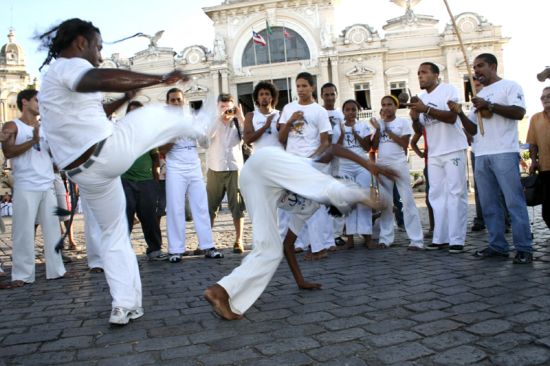Dive into the mesmerizing world of Capoeira, an art form that elegantly fuses fight, dance, and culture. Uncover the profound philosophy and intrinsic values that form its core, making it much more than just a martial art. This enriching journey not only builds physical strength but also serves as a pathway to self-discovery and connection with the roots of Brazilian culture.
Explore how Capoeira, stemming from the African slaves in Brazil during the 16th century, has evolved into a widely acclaimed art form recognized worldwide. Delve into the symbolism embedded in its intricate movements, the importance of music and rhythm, and how it contributes to fostering a sense of community among its practitioners. Learn about the intriguing stories behind the legendary masters of Capoeira, their teachings, and their profound impact on the culture.
Furthermore, understand how the practice of Capoeira transcends beyond the physical realm. It’s a compelling dialogue between body and spirit, where each movement resonates with deep-seated cultural values, such as respect, resilience, and freedom. Witness how Capoeira goes beyond being an art form, acting as a tool for social inclusion and personal development, instilling self-confidence, discipline, and a sense of belonging among its practitioners. Get ready to embark on a captivating journey through the philosophy and values of Capoeira, a powerful symphony of fight, dance, and culture.
The Philosophy Behind Capoeira
As a unique blend of martial art, dance, and cultural tradition, Capoeira embodies a philosophy deeply rooted in the principles of freedom, respect, cunning, and creativity. These principles, born out of the context of slavery and resistance in colonial Brazil, continue to be foundational values within the practice of Capoeira today.
Freedom
The principle of freedom is a critical component of Capoeira’s philosophy. Initially, Capoeira was developed as a form of self-defense by enslaved Africans in Brazil. It was designed to look like a dance, in order to be practiced undetected by the slave masters. This clever camouflage demonstrates the importance of freedom and resistance to oppression within Capoeira’s core philosophy.
Respect
Respect is another important aspect of Capoeira’s philosophy. Capoeira promotes a sense of community and mutual respect among its practitioners, known as Capoeiristas. In a Capoeira roda (circle), participants are expected to respect the rhythm of the music, the game’s rules, and, most importantly, their fellow Capoeiristas. This respect extends beyond the roda, influencing the overall behavior of the practitioners in their daily lives.
Core Values of Capoeira
Beyond its philosophical principles, Capoeira is also guided by a set of core values that provide structure and guidance for its practice.

Cunning and Creativity
Cunning and creativity are central to the practice of Capoeira. These values are reflected in the art’s fluid movements and improvisational nature. Capoeiristas must constantly adapt and respond to their opponent’s moves, often in unexpected and creative ways.
Physical and Mental Strength
Physical and mental strength are also highly valued in Capoeira. The martial art requires not only physical agility and endurance, but also mental fortitude and concentration. The ability to maintain rhythm, anticipate an opponent’s moves, and execute complex sequences demands a high level of mental acuity.
Capoeira as a Cultural Expression
Capoeira is more than a martial art or a dance; it is a powerful form of cultural expression. The traditional music, rituals, and language used in Capoeira reflect its rich Afro-Brazilian heritage.
Music and Rituals
Music is an essential part of Capoeira, setting the rhythm and mood for the game. Traditional instruments, such as the berimbau, atabaque, and pandeiro, create the unique soundscape of Capoeira. Rituals, such as the roda and the chamada, are integral parts of the practice, imbuing it with a deep sense of tradition and communal spirit.
Language
The use of the Portuguese language and Afro-Brazilian dialects in Capoeira songs and rituals emphasizes the art’s cultural origins and adds another layer of complexity to its practice. Knowledge of these languages allows practitioners to better understand the songs’ lyrics, which often contain historical references and philosophical teachings.
Final Thoughts
Ultimately, the philosophy and values of Capoeira reflect its historical roots and cultural significance. Its focus on freedom, respect, cunning, and creativity, along with physical and mental strength, make Capoeira a rich and multifaceted practice that goes beyond the physical realm. It is a dance, a fight, a game, and most importantly, a powerful form of cultural expression.
Conclusion
In conclusion, Capoeira is not merely a combination of martial arts and dance, but a profound expression of culture and philosophy. Its historical underpinnings in the struggle for freedom during colonial times shape its guiding principles today. Fundamentally, it champions freedom, respect, cunning, and creativity – values that echo not just in the roda, but in the daily lives of its practitioners. It is a testament to human resilience and adaptability, and a celebration of community spirit. The respect for others, fluid movements, improvisational strategies, and the need for both physical agility and mental acuity illustrate the comprehensive nature of this art form. Beyond the physical realm, Capoeira also underscores the importance of music, rituals, and language as mediums of cultural expression, enhancing its richness and depth. Knowledge of the art’s songs and language adds a layer of complexity and connection to its Afro-Brazilian roots. Therefore, Capoeira is a multifaceted practice that goes beyond the physical, embodying a dance, a fight, a game, and most importantly, a powerful form of cultural expression.
